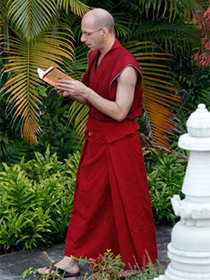- Home
- FPMT Homepage
Foundation for the Preservation of the Mahayana Tradition
The FPMT is an organization devoted to preserving and spreading Mahayana Buddhism worldwide by creating opportunities to listen, reflect, meditate, practice and actualize the unmistaken teachings of the Buddha and based on that experience spreading the Dharma to sentient beings. We provide integrated education through which people’s minds and hearts can be transformed into their highest potential for the benefit of others, inspired by an attitude of universal responsibility and service. We are committed to creating harmonious environments and helping all beings develop their full potential of infinite wisdom and compassion. Our organization is based on the Buddhist tradition of Lama Tsongkhapa of Tibet as taught to us by our founders Lama Thubten Yeshe and Lama Thubten Zopa Rinpoche.
- Willkommen
Die Stiftung zur Erhaltung der Mahayana Tradition (FPMT) ist eine Organisation, die sich weltweit für die Erhaltung und Verbreitung des Mahayana-Buddhismus einsetzt, indem sie Möglichkeiten schafft, den makellosen Lehren des Buddha zuzuhören, über sie zur reflektieren und zu meditieren und auf der Grundlage dieser Erfahrung das Dharma unter den Lebewesen zu verbreiten.
Wir bieten integrierte Schulungswege an, durch denen der Geist und das Herz der Menschen in ihr höchstes Potential verwandelt werden zum Wohl der anderen – inspiriert durch eine Haltung der universellen Verantwortung und dem Wunsch zu dienen. Wir haben uns verpflichtet, harmonische Umgebungen zu schaffen und allen Wesen zu helfen, ihr volles Potenzial unendlicher Weisheit und grenzenlosen Mitgefühls zu verwirklichen.
Unsere Organisation basiert auf der buddhistischen Tradition von Lama Tsongkhapa von Tibet, so wie sie uns von unseren Gründern Lama Thubten Yeshe und Lama Thubten Zopa Rinpoche gelehrt wird.
- Bienvenidos
La Fundación para la preservación de la tradición Mahayana (FPMT) es una organización que se dedica a preservar y difundir el budismo Mahayana en todo el mundo, creando oportunidades para escuchar, reflexionar, meditar, practicar y actualizar las enseñanzas inconfundibles de Buda y en base a esa experiencia difundir el Dharma a los seres.
Proporcionamos una educación integrada a través de la cual las mentes y los corazones de las personas se pueden transformar en su mayor potencial para el beneficio de los demás, inspirados por una actitud de responsabilidad y servicio universales. Estamos comprometidos a crear ambientes armoniosos y ayudar a todos los seres a desarrollar todo su potencial de infinita sabiduría y compasión.
Nuestra organización se basa en la tradición budista de Lama Tsongkhapa del Tíbet como nos lo enseñaron nuestros fundadores Lama Thubten Yeshe y Lama Zopa Rinpoche.
A continuación puede ver una lista de los centros y sus páginas web en su lengua preferida.
- Bienvenue
L’organisation de la FPMT a pour vocation la préservation et la diffusion du bouddhisme du mahayana dans le monde entier. Elle offre l’opportunité d’écouter, de réfléchir, de méditer, de pratiquer et de réaliser les enseignements excellents du Bouddha, pour ensuite transmettre le Dharma à tous les êtres. Nous proposons une formation intégrée grâce à laquelle le cœur et l’esprit de chacun peuvent accomplir leur potentiel le plus élevé pour le bien d’autrui, inspirés par le sens du service et une responsabilité universelle. Nous nous engageons à créer un environnement harmonieux et à aider tous les êtres à épanouir leur potentiel illimité de compassion et de sagesse. Notre organisation s’appuie sur la tradition guéloukpa de Lama Tsongkhapa du Tibet, telle qu’elle a été enseignée par nos fondateurs Lama Thoubtèn Yéshé et Lama Zopa Rinpoché.
Visitez le site de notre Editions Mahayana pour les traductions, conseils et nouvelles du Bureau international en français.
Voici une liste de centres et de leurs sites dans votre langue préférée
- Benvenuto
L’FPMT è un organizzazione il cui scopo è preservare e diffondere il Buddhismo Mahayana nel mondo, creando occasioni di ascolto, riflessione, meditazione e pratica dei perfetti insegnamenti del Buddha, al fine di attualizzare e diffondere il Dharma fra tutti gli esseri senzienti.
Offriamo un’educazione integrata, che può trasformare la mente e i cuori delle persone nel loro massimo potenziale, per il beneficio di tutti gli esseri, ispirati da un’attitudine di responsabilità universale e di servizio.
Il nostro obiettivo è quello di creare contesti armoniosi e aiutare tutti gli esseri a sviluppare in modo completo le proprie potenzialità di infinita saggezza e compassione.
La nostra organizzazione si basa sulla tradizione buddhista di Lama Tsongkhapa del Tibet, così come ci è stata insegnata dai nostri fondatori Lama Thubten Yeshe e Lama Zopa Rinpoche.
Di seguito potete trovare un elenco dei centri e dei loro siti nella lingua da voi prescelta.
- 欢迎 / 歡迎
简体中文
“护持大乘法脉基金会”( 英文简称:FPMT。全名:Foundation for the Preservation of the Mahayana Tradition) 是一个致力于护持和弘扬大乘佛法的国际佛教组织。我们提供听闻,思维,禅修,修行和实证佛陀无误教法的机会,以便让一切众生都能够享受佛法的指引和滋润。
我们全力创造和谐融洽的环境, 为人们提供解行并重的完整佛法教育,以便启发内在的环宇悲心及责任心,并开发内心所蕴藏的巨大潜能 — 无限的智慧与悲心 — 以便利益和服务一切有情。
FPMT的创办人是图腾耶喜喇嘛和喇嘛梭巴仁波切。我们所修习的是由两位上师所教导的,西藏喀巴大师的佛法传承。
繁體中文
護持大乘法脈基金會”( 英文簡稱:FPMT。全名:Found
ation for the Preservation of the Mahayana Tradition ) 是一個致力於護持和弘揚大乘佛法的國際佛教組織。我們提供聽聞, 思維,禪修,修行和實證佛陀無誤教法的機會,以便讓一切眾生都能 夠享受佛法的指引和滋潤。 我們全力創造和諧融洽的環境,
為人們提供解行並重的完整佛法教育,以便啟發內在的環宇悲心及責 任心,並開發內心所蘊藏的巨大潛能 — 無限的智慧與悲心 – – 以便利益和服務一切有情。 FPMT的創辦人是圖騰耶喜喇嘛和喇嘛梭巴仁波切。
我們所修習的是由兩位上師所教導的,西藏喀巴大師的佛法傳承。 察看道场信息:
- FPMT Homepage
- News/Media
-
- Study & Practice
-
-
- About FPMT Education Services
- Latest News
- Programs
- New to Buddhism?
- Buddhist Mind Science: Activating Your Potential
- Heart Advice for Death and Dying
- Discovering Buddhism
- Living in the Path
- Exploring Buddhism
- FPMT Basic Program
- FPMT Masters Program
- FPMT In-Depth Meditation Training
- Maitripa College
- Lotsawa Rinchen Zangpo Translator Program
- Universal Education for Compassion & Wisdom
- Online Learning Center
-
- Prayers & Practice Materials
- Overview of Prayers & Practices
- Full Catalogue of Prayers & Practice Materials
- Explore Popular Topics
- Benefiting Animals
- Chenrezig Resources
- Death & Dying Resources
- Lama Chopa (Guru Puja)
- Lama Zopa Rinpoche: Compendium of Precious Instructions
- Lama Zopa Rinpoche: Life Practice Advice
- Lama Zopa Rinpoche Practice Series
- Lamrim Resources
- Mantras
- Prayer Book Updates
- Purification Practices
- Sutras
- Thought Transformation (Lojong)
- Audio Materials
- Dharma Dates - Tibetan Calendar
- Translation Services
- Publishing Services
- Ways to Offer Support
- Prayers & Practice Materials
-
- Teachings and Advice
- Find Teachings and Advice
- Lama Zopa Rinpoche Advice Page
- Lama Zopa Rinpoche: Compendium of Precious Instructions
- Lama Zopa Rinpoche Video Teachings
- ༧སྐྱབས་རྗེ་བཟོད་པ་རིན་པོ་ཆེ་མཆོག་ནས་སྩལ་བའི་བཀའ་སློབ་བརྙན་འཕྲིན།
- Podcasts
- Lama Yeshe Wisdom Archive
- Buddhism FAQ
- Dharma for Young People
- Resources on Holy Objects
- Teachings and Advice
-
-
*If a menu item has a submenu clicking once will expand the menu clicking twice will open the page.
-
-
- Centers
-
- Teachers
-
- Projects
-
-
-
-
*If a menu item has a submenu clicking once will expand the menu clicking twice will open the page.
-
-
- FPMT
-
-
-
-
-
One must practice with the bodhisattva attitude every day. People can’t see your mind, what people see is a manifestation of your attitude in your actions of body and speech. Pay attention to your attitude all the time, guard it as if you are the police, or like a maid cares for a child, like a bodyguard, or like you are the guru and your mind is your disciple.
Lama Zopa Rinpoche
-
-
-
- Shop
-
-
-
The Foundation Store is FPMT’s online shop and features a vast selection of Buddhist study and practice materials written or recommended by our lineage gurus. These items include homestudy programs, prayers and practices in PDF or eBook format, materials for children, and other resources to support practitioners.
Items displayed in the shop are made available for Dharma practice and educational purposes, and never for the purpose of profiting from their sale. Please read FPMT Foundation Store Policy Regarding Dharma Items for more information.
-
-
Advice from Lama Zopa Rinpoche
22
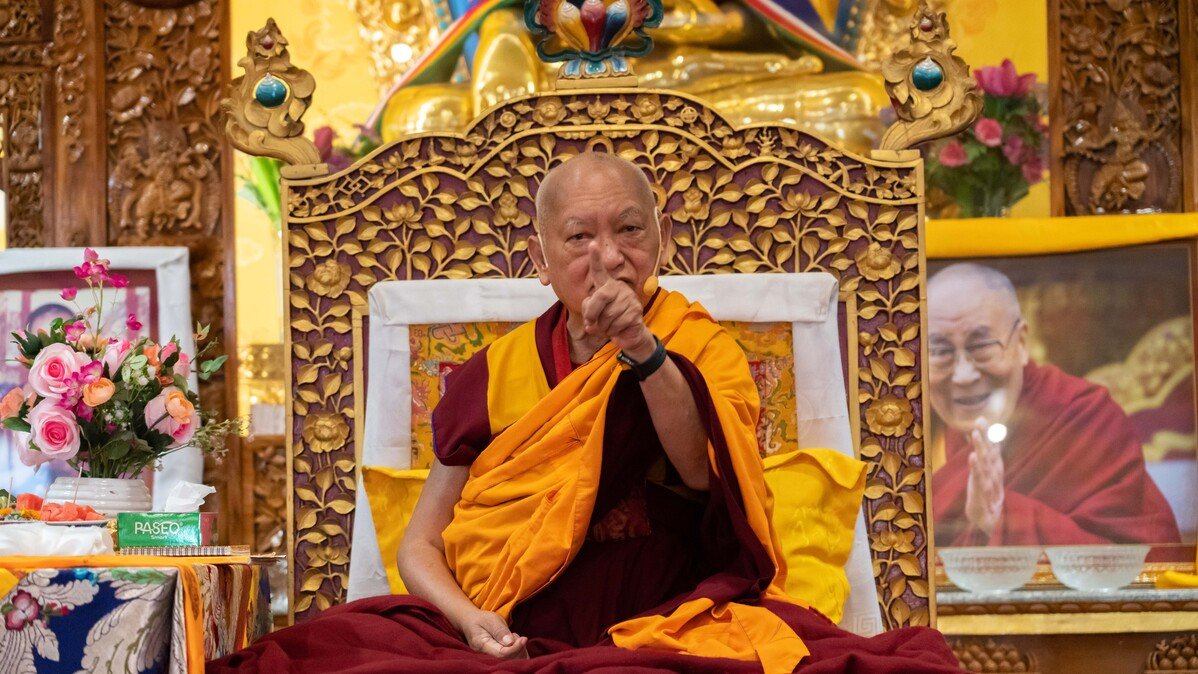
Lama Zopa Rinpoche teaching at the Kopan November Course, Nepal, December, 2022. Photo by Ven. Lobsang Sherab.
Everything comes from the mind, Rinpoche reminds us in this second teaching from the fifty-third lamrim meditation course at Kopan Monastery, given on December 8, 2022. Samsara, nirvana, suffering, enlightenment, all appearances we have, anything we hold as good or bad – all of this comes from the mind. Rinpoche uses the letter Z as an example. This letter appears and we hold on to that appearance. In fact, everything is like this. Nothing exists from its own side, not even an atom. Everything comes from the mind, is merely imputed by the mind, and later due to the false hallucination, appears as totally existing.
Do everything for sentient beings, Rinpoche advises, with a bodhicitta motivation. We have to cultivate the thought to naturally wish to lead every sentient being we meet to enlightenment, like how a mother feels for her child who fell in a fire. Even one second of her child being in a fire is unbearable to her. This is how it should feel toward sentient beings is samsara.
Rinpoche shared the following quotation from Lama Tsongkhapa’s Three Principal Aspects of the Path to Enlightenment:
Without the wisdom realizing ultimate reality,
Even though you have generated renunciation and the mind of enlightenment,
You cannot cut the root cause of circling.
Therefore, attempt the method to realize dependent arising.
To eliminate ignorance, we have to realize the Prasangika school’s view of emptiness. The four schools happened in Buddha’s time in India, but the Prasangika view – this is the one we have to realize.
Rinpoche offers the oral transmission of the Heart Sutra starting at 2:14:33 in the video.
We invite you to go deeper into the topics presented here, plus many others, by watching Rinpoche’s video below and reading the full transcript of Rinpoche’s teaching. An unedited video recording of the live transcription alongside Rinpoche’s teaching is also available.
Watch Lama Zopa Rinpoche’s teaching “How the Letter Z Comes Into Existence”:
https://youtu.be/RVRJolNbM-U
This summary of Lama Zopa Rinpoche’s teaching is by Carina Rumrill, with editorial input and additions by Justin Jenkins. This summary is meant to highlight key topics presented by Rinpoche in the recorded video and is not intended to serve as a full representation of Rinpoche’s teaching, which is best received through watching the video.
These teachings are being livestreamed with transcription so that everyone can receive them, until the Kopan retreat ends on December 26, 2022. Subscribe to the FPMT YouTube channel to get notified when new videos are uploaded or a livestream starts. Livestreams are also announced on Telegram as well as Lama Zopa Rinpoche’s Facebook page, and the FPMT and Kopan Monastery Facebook pages. Livestreams can also be watched without a transcript for those who prefer that format.
Lama Zopa Rinpoche is the spiritual director of the Foundation for the Preservation of Mahayana Tradition (FPMT), a Tibetan Buddhist organization dedicated to the transmission of the Mahayana Buddhist tradition and values worldwide through teaching, meditation and community service.
15
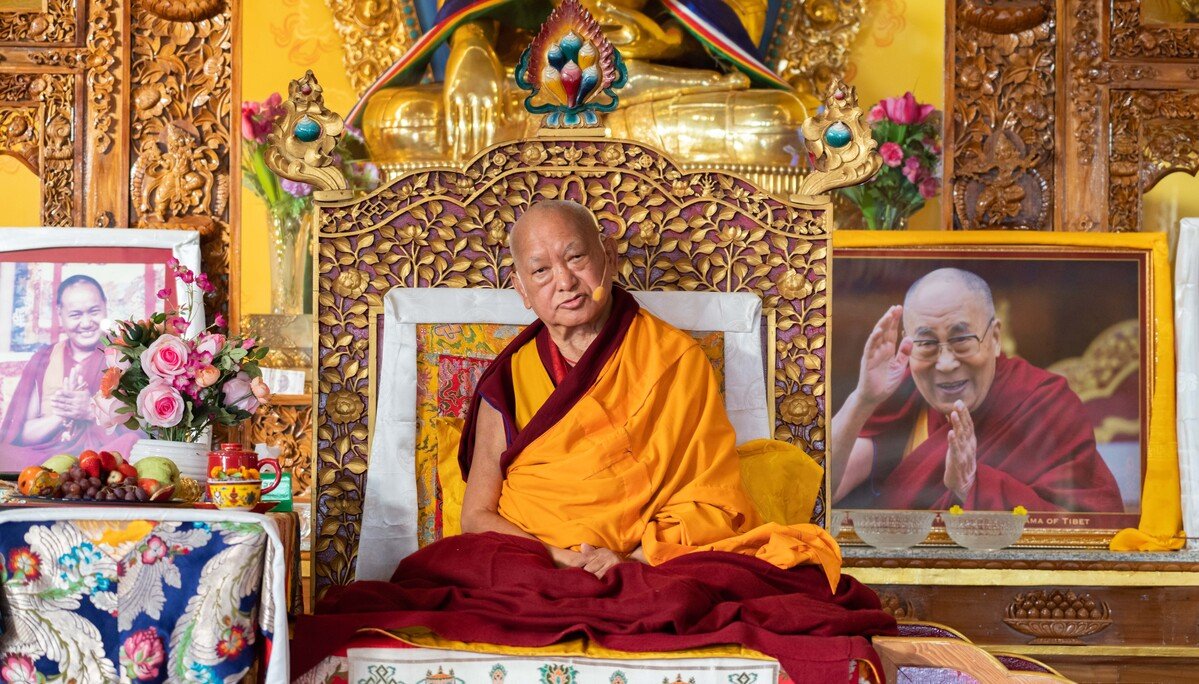
Lama Zopa Rinpoche teaching at the fifty-third Kopan lamrim meditation course, Kopan Monastery, Nepal, December 2022. Photo by Ven. Lobsang Sherab.
In this first teaching Rinpoche offered to the fifty-third lamrim meditation course at Kopan Monastery, Nepal, on December 7, 2022, Rinpoche thanked everyone for coming to Nepal to learn lamrim (the gradual path to enlightenment) and get to know the mind. The purpose of this is not just to intellectually learn, but to train the mind in non-anger, non-attachment, non-ignorance. We have tried everything for our happiness – studying in the university, trying yoga, so many activities in our busy lives done with self-cherishing thought. But we didn’t think to protect our minds, didn’t think of developing ourselves. Lamrim introduces us to who we are. The more we know Dharma, the more we know ourselves. Otherwise, we cheat ourselves with wrong concepts and ignorance.
The answers to why we have been suffering since beginningless rebirths is in the lamrim. The effect of meditating on the lamrim is peace and freedom because it leaves so many positive imprints for the mind to become closer to enlightenment. It brings the light of Dharma wisdom within oneself. This is called the gradual path to enlightenment because we can’t just jump to bodhicitta without having the lower realizations, we need the foundation. However, even though we are starting at the beginning, it is important to practice with the motivation of bodhicitta.
We invite you to go deeper into the topics presented here, plus many others, by watching Rinpoche’s video below and reading the full transcript of Rinpoche’s teaching. An unedited video recording of the live transcription alongside Rinpoche’s teaching is also available.
Watch Lama Zopa Rinpoche’s teaching “By Studying Buddha Dharma, You Come to Know Yourself”:
This summary of Lama Zopa Rinpoche’s teaching is by Carina Rumrill, with editorial input and additions by Justin Jenkins. This summary is meant to highlight key topics presented by Rinpoche in the recorded video and is not intended to serve as a full representation of Rinpoche’s teaching, which is best received through watching the video.
These teachings are being livestreamed with transcription so that everyone can receive them, until the Kopan retreat ends on December 26, 2022. Subscribe to the FPMT YouTube channel to get notified when new videos are uploaded or a livestream starts. Livestreams are also announced on Telegram as well as Lama Zopa Rinpoche’s Facebook page, and the FPMT and Kopan Monastery Facebook pages. Livestreams can also be watched without a transcript for those who prefer that format.
Lama Zopa Rinpoche is the spiritual director of the Foundation for the Preservation of Mahayana Tradition (FPMT), a Tibetan Buddhist organization dedicated to the transmission of the Mahayana Buddhist tradition and values worldwide through teaching, meditation and community service.
6
Blessing Sentient Beings in the Ocean
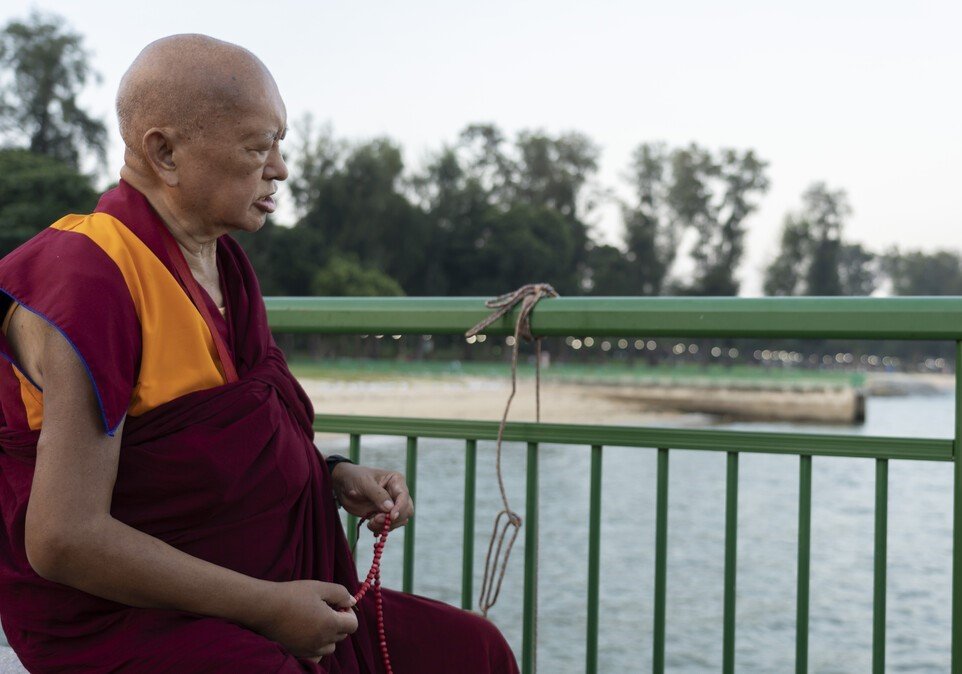
Lama Zopa Rinpoche leading prayers on how to bless sentient beings in the ocean, as well as blessing the ocean with the Namgyalma mantra board and blessed water, Singapore, July 2022. Photo by Ven. Lobsang Sherab.
Lama Zopa Rinpoche offered this video teaching on July 8, 2022 from Bedok Jetty, a popular fishing and walking pier, in Singapore. In this intimate video, Rinpoche shares prayers and mantras which are most beneficial for blessing beings in the ocean. Rinpoche stresses that these practices are not only beneficial to the beings abiding in the water, but are also enjoyable for us to offer.
We are also so happy to share this new booklet from FPMT Education Services, “Blessing Animals in the Ocean” which is based on the instructions from Rinpoche on this meaningful practice. This practice can be done on sentient beings living in any body of water including oceans, lakes, ponds, rivers, etc.
We invite you to go deeper into the topics presented here, plus many others, by watching Rinpoche’s video below.
Watch Lama Zopa Rinpoche’s teaching “Kindness of Sentient Beings”:
This summary of Lama Zopa Rinpoche’s teaching is by Carina Rumrill, with editorial input and additions by Justin Jenkins. This summary is meant to highlight key topics presented by Rinpoche in the recorded video and is not intended to serve as a full representation of Rinpoche’s teaching, which is best received through watching the video.
Download “Blessing Animals in the Ocean” from the Foundation Store: https://shop.fpmt.org/Blessing-the-Animals-in-the-Ocean-PDF-_p_3758.html
Lama Zopa Rinpoche is the spiritual director of the Foundation for the Preservation of Mahayana Tradition (FPMT), a Tibetan Buddhist organization dedicated to the transmission of the Mahayana Buddhist tradition and values worldwide through teaching, meditation and community service.
- Tagged: advice from lama zopa rinpoche, video
23
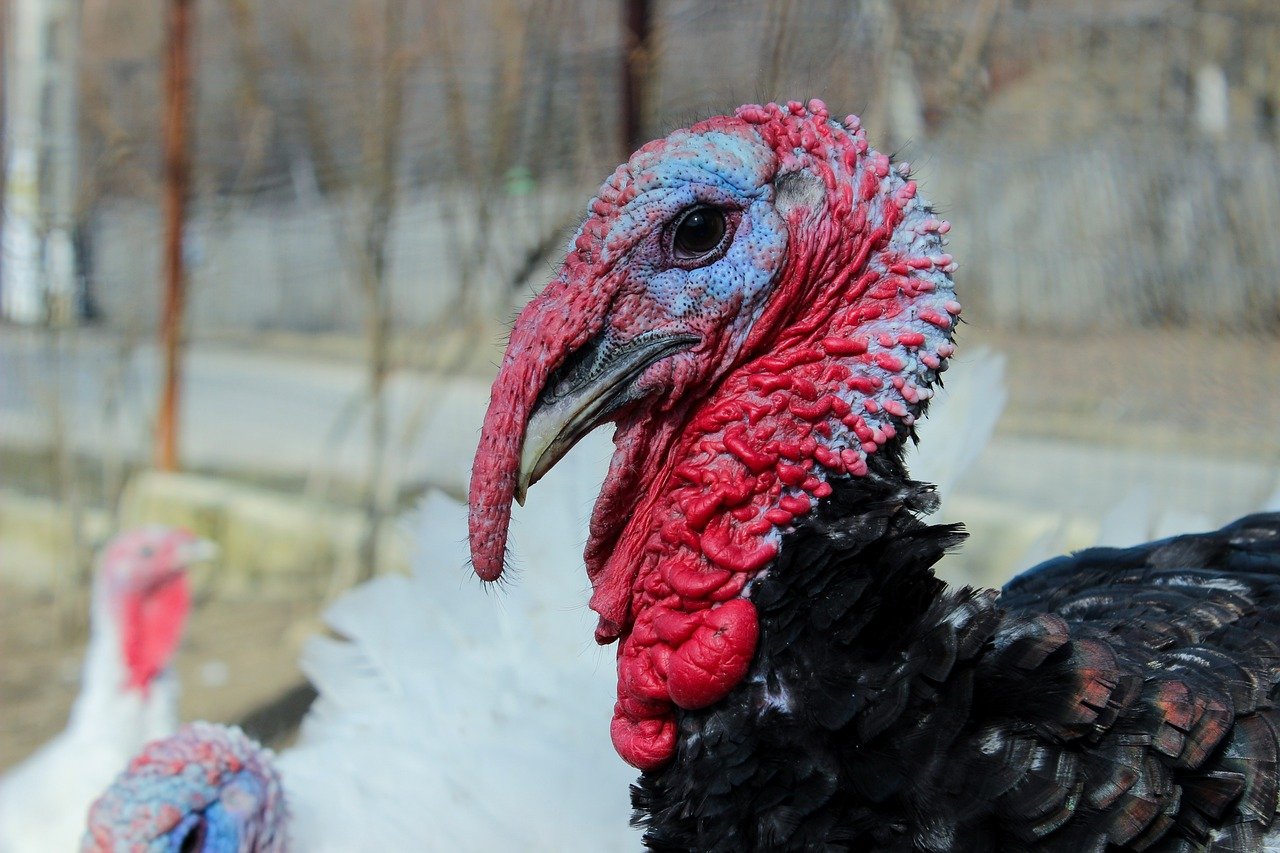
Turkeys at a farm. Photo courtesy of Pixabay.
Every year in the United States, tens of millions of turkeys are killed for the holiday of Thanksgiving, which is this Thursday, November 24, 2022. Lama Zopa Rinpoche offered advice in a 2018 teaching to help benefit the turkeys killed, and how we can think during the holiday.
In “Prayers and Practices to Do for Turkeys at Thanksgiving”, Rinpoche explains,
“If you are Buddhist, or just someone who does not want to suffer now or in endless future lives as well, having to experience unbelievably suffering, you need to purify your past negative karma and stop creating any more so that you will not be reborn as a turkey over and over again. … If you do have to eat turkey because of some family obligation, then at least do some mantras and prayers to benefit the turkeys, such as the four immeasurables with tonglen. Otherwise, if you just enjoy eating turkey together with the rest of the Americans who are not Buddhist, who do not know Dharma, who have not generated compassion for the turkeys, you create much negative karma.”
In this teaching Rinpoche provides detailed instructions on practices to purify negative karma, such as Vajrasattva, taking the eight Mahayana precepts, reciting sutras, engaging in nyung ne fasting retreats, generating love and compassion through the practice of tonglen and the Four Immeasureables, practicing Chenrezig, Medicine Buddha puja and specific mantras. Rinpoche also offers a special dedication to purify any negative karma that could cause future rebirth as a turkey.
Rinpoche explains that these practices can be applied beyond the Thanksgiving holiday, “These are simple methods, but they have unbelievably profound benefits, like the sky. You can also do more or different practices as well. These are just suggestions. You can also do these practices at Christmas or on other occasions where turkeys and so many other animals are sacrificed and eaten.”
For links to practice materials these detailed instructions, we invite you to read “Prayers and Practices to Do for Turkeys at Thanksgiving”. Included on the page is an additional short teaching from Rinpoche which we include below.
Further Commentary and Advice for Thanksgiving
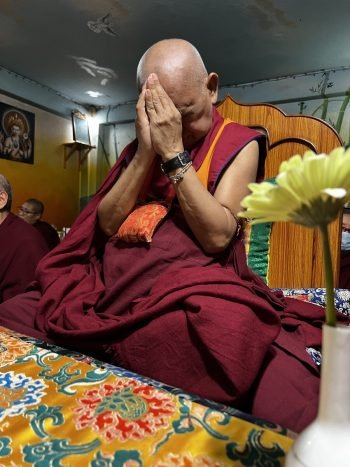
Lama Zopa Rinpoche in Boudanath, March 2022. Photo by Ven. Roger Kunsang.
I don’t think the general population of America accepts clairvoyance, but if it did, people would understand where all the sufferings, such as depression, come from. The way people normally think—for example, what causes depression—is very limited. They only think about things that are to do with this life. If they had clairvoyance they could see much deeper; they could see things such as past and future lives. People normally think of only this life, not past and future lives.
In the past, many of the turkeys that Americans are eating were Americans who in the past had killed turkeys. Often it could even be a past family member that they are now eating.
There’s a sutra story about Buddha’s disciple Shariputra, who excelled in wisdom. Once when he was on his alms round he looked into a family’s house and saw that the father, who used to catch fish in his backyard pond, had died and been reborn as a fish in that pond. The mother, his wife, who had been very attached to the home, had also died and been reborn as the family dog. And the son’s enemy, who had been very attached to the son’s wife, had died and been reborn as their child. The son was holding the child, his former enemy, eating the fish, his late father, and beating the dog, his late mother, while it chewed on fish bones. Shariputra then observed, “The son is eating his father’s flesh, beating his mother with a stick, and cuddling his enemy on his lap—samsaric existence makes me laugh.”
If we have animals we have to remember this story and take care of them well. It is very important to understand the benefits of taking care of our pets and other animals by giving them food and drink. Think that you are making charity and don’t just do it out of attachment, thinking that you love the shape of the animals or something, doing everything simply for your own happiness. It’s the same with looking after your children. You create a child with attachment, for your own happiness, thinking how your life would be unbelievably happy if you had a child. Then you take care of the child, but it is for your own happiness.
It is also important to recognize and remember your animals’ most unbelievable kindness, how they have been kind to you in three ways, and then with that awareness give them food and drink. First recite OṂ MAṆI PADME HŪṂ and then blow over the food and drink to bless it. If you have mani pills, it’s good to crush them and put them into the food and drink, or even add blessed water. You don’t have to get blessed water from a lama; you can make it yourself. Whether or not you have daily commitments, recite OṂ MAṆI PADME HŪṂ and other mantras, such as OṂ PADMO UṢHṆĪṢHA VIMALE HŪṂ PHAṬ, the Mitrugpa mantra and so forth, and then blow on the water. You can recite however many repetitions of each mantra you want, like seven, ten, fifteen, or more, blow on the animal’s food or water and make prayers as well. Similarly, you can keep a bottle of water nearby and when you’ve done your commitments you can blow on the water and then use that to put on the food and water that you give to the animals.
Then make this dedication prayer:
Due to all the past, present, and future merits collected by me and all the merits of the three times collected by numberless buddhas and numberless sentient beings, may all these animals (you can also include your family members, especially your father and mother) never ever get reborn back into the lower realms but be reborn in a pure land where they can achieve enlightenment, or, if not, at least receive a perfect human body, meet the Mahayana teachings, and a perfectly qualified guru revealing the unmistaken path to enlightenment, and by pleasing the holy mind of the virtuous friend may they attain enlightenment as quickly as possible.
Finally, please remember the unbelievable benefits of making charity of food to the animals. As the Buddha said, “Anybody who makes charity well during the period my teachings exist will receive great enjoyments for 80,000 eons, even if the material that person offers is merely the size of a hair. That person will be free from pain and disease, will enjoy great happiness, will be enriched with all manner of desirable things, and will eventually achieve the result: peerless cessation and complete enlightenment.”
This advice has been extracted from the page “Prayers and Practices to Do for Turkeys at Thanksgiving,” which shares a teaching and advice given by Lama Zopa Rinpoche in Switzerland in 2018. Scribed by Holly Ansett. Edited by Nicholas Ribush, November 2020.
For more mantras and resources for mantra recitation, visit FPMT Education Services’ page on mantras. You can find a full catalogue of all FPMT prayers, practices, and advice materials on FPMT.org.
Lama Zopa Rinpoche is the spiritual director of the Foundation for the Preservation of Mahayana Tradition (FPMT), a Tibetan Buddhist organization dedicated to the transmission of the Mahayana Buddhist tradition and values worldwide through teaching, meditation and community service.
- Tagged: thanksgiving
21
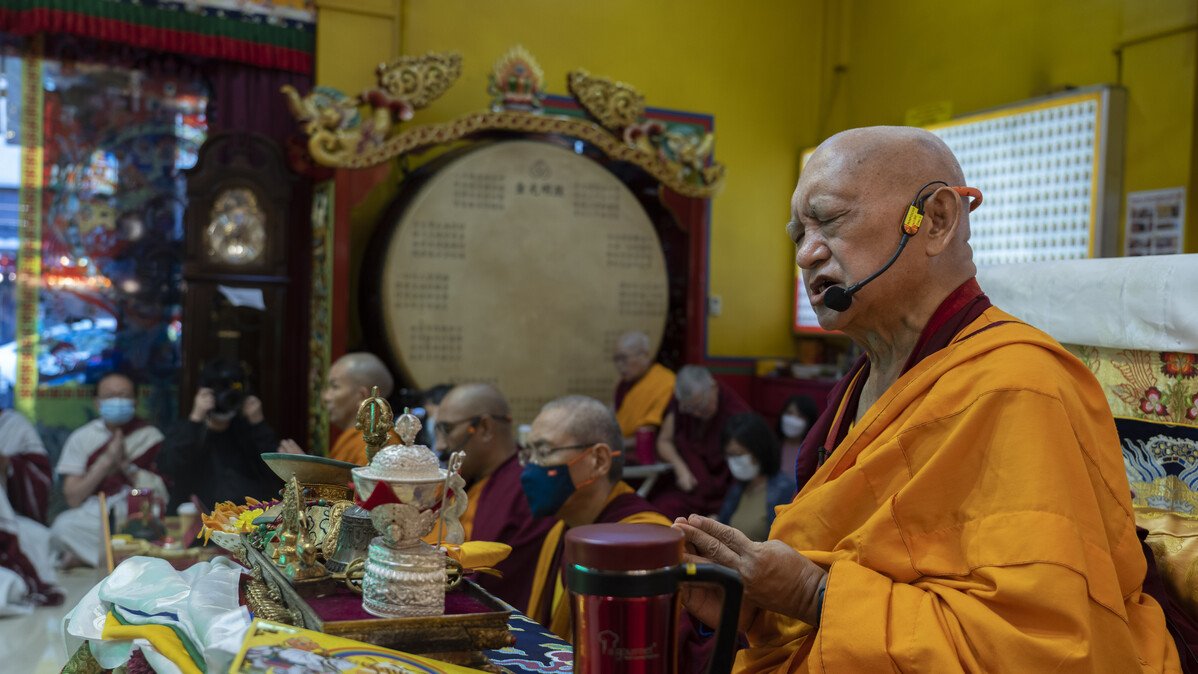
Lama Zopa Rinpoche offering teachings at Thekchen Choling, Singapore, September 1, 2022. Photo by Ven. Lobsang Sherab.
Lama Zopa Rinpoche continually stresses the importance of remembering impermanence and death, preparing for our own deaths, and helping others at the time of death. In this teaching, given at Thekchen Choling in Singapore on September 1, Rinpoche reminds us how unbelievably rare it is to receive this perfect human rebirth. Since we have been so fortunate to receive this, and we cannot say for certain when we will die, we must make the most use of the opportunity we have as human beings, in the most beneficial way—by practicing Dharma.
Watch Lama Zopa Rinpoche’s teaching “The Importance of Remembering Impermanence and Death”:
Supplemental Materials for Death & Dying
Many newly available or recently revised practice materials are available for students wishing to help others at the time of death, as well as prepare for our own dying and death.
- Liberation Cloth to help others at the time of death.
- Helping Yourself and Others Die Happily: Instructions and Practices for the Time of Death
Lama Zopa Rinpoche asked that the practices found in this booklet be compiled to make it easy for us students to prepare for our own death, and also easy for us to help other people who are dying or dead. - Liberation Tools to Help the Dying and Deceased
This resource, previously known as the Liberation Box, is a collection of tools to help the dying and deceased has been assembled according to Lama Zopa Rinpoche’s advice. It contains powerful methods for ensuring a fortunate rebirth for those who are in the process of dying or have just died. - Practicing the Five Powers Near the Time of Death
As Rinpoche says in Dying Happily with the Five Powers, practicing “the five powers to be applied during life” serves as a preparation for our death. But as the time of our death approaches, we should specifically engage in the practice of “the five powers for near the time of death,” which are what Rinpoche explains in this booklet. - The Array of Sukhavati Pure Land: A Concise Mahayana Sutra – MP3 Download
This album contains Lama Zopa Rinpoche’s oral transmission (*lung) of The Array of Sukhavati Pure Land: A Concise Mahayana Sutra, a prayer that came from Buddha Amitabha. - Holy Objects to Place on the Body at the Time of Death
Contains four sets of holy objects to be placed on the body of the person or animal that is in the process of dying. Cut out one set and place it face down on the dying or deceased person’s chest. Leave it there until the body needs to be moved or washed. - Death & Dying: Practices and Resources homepage
This robust resource page has numerous essential practices related to the topic of death and dying, additional teachings and advice from Lama Zopa Rinpoche, and community service resources.
This summary of Lama Zopa Rinpoche’s teaching is by Carina Rumrill. This summary is meant to highlight key topics presented by Rinpoche in the recorded video and is not intended to serve as a full representation of Rinpoche’s teaching, which is best received through watching the video.
Lama Zopa Rinpoche is the spiritual director of the Foundation for the Preservation of Mahayana Tradition (FPMT), a Tibetan Buddhist organization dedicated to the transmission of the Mahayana Buddhist tradition and values worldwide through teaching, meditation and community service.
- Tagged: advice from lama zopa rinpoche, death and dying, impermanence and death, padmasambhava, video
4
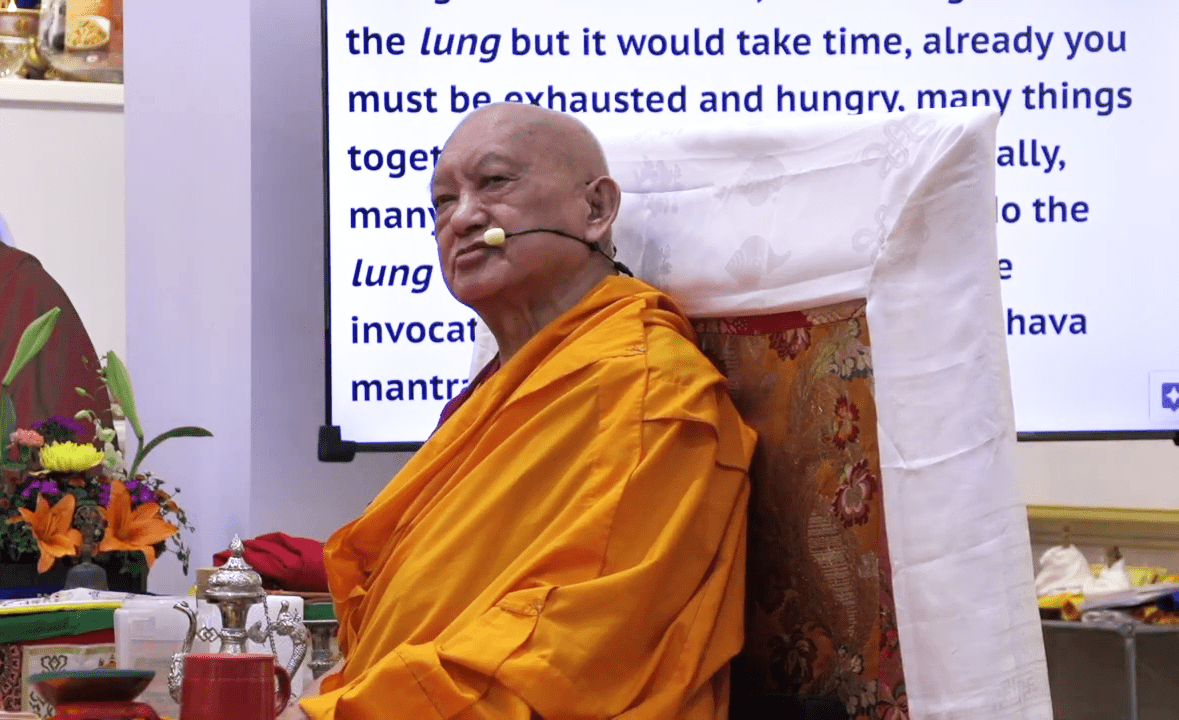
Lama Zopa Rinpoche teaching at the end of a Most Secret Hayagriva puja, Amitabha Buddhist Centre, Singapore, September 4, 2022.
Lama Zopa Rinpoche offered this video teaching on September 4, 2022 from Amitabha Buddhist Centre, Singapore, at the end of a Most Secret Hayagriva tsog kong puja. This puja was done to stop wars, famine, disease, and the dangers of earth, water, fire, and wind. This puja was part of the more extensive advice Rinpoche gave recently for generating peace in the world.
During the teaching Rinpoche gave the lungs of several Padmasambhava texts and advised students in Singapore to recite these prayers in order to avoid problems for their country during the next two years.
Read Lama Zopa Rinpoche’s recent advice for generating world peace: https://fpmt.org/lama-zopa-rinpoche-news-and-advice/lama-zopa-rinpoches-recent-advice-for-generating-peace-in-the-world/
We invite you to go deeper into the topics presented here, plus many others, by watching Rinpoche’s video, below, and reading the full transcript of Rinpoche’s teaching.
Watch Lama Zopa Rinpoche’s teaching “Whenever You Generate Faith in Padmasambhava, He is There”:
This summary of Lama Zopa Rinpoche’s teaching is by Carina Rumrill, based on the live transcript by Ven. Joan Nicell. This summary is meant to highlight key topics presented by Rinpoche in the recorded video and is not intended to serve as a full representation of Rinpoche’s teaching, which is best received through watching the video and/or reading the full transcript.
Lama Zopa Rinpoche is the spiritual director of the Foundation for the Preservation of Mahayana Tradition (FPMT), a Tibetan Buddhist organization dedicated to the transmission of the Mahayana Buddhist tradition and values worldwide through teaching, meditation and community service.
- Tagged: advice from lama zopa rinpoche, padmasambhava, video
28
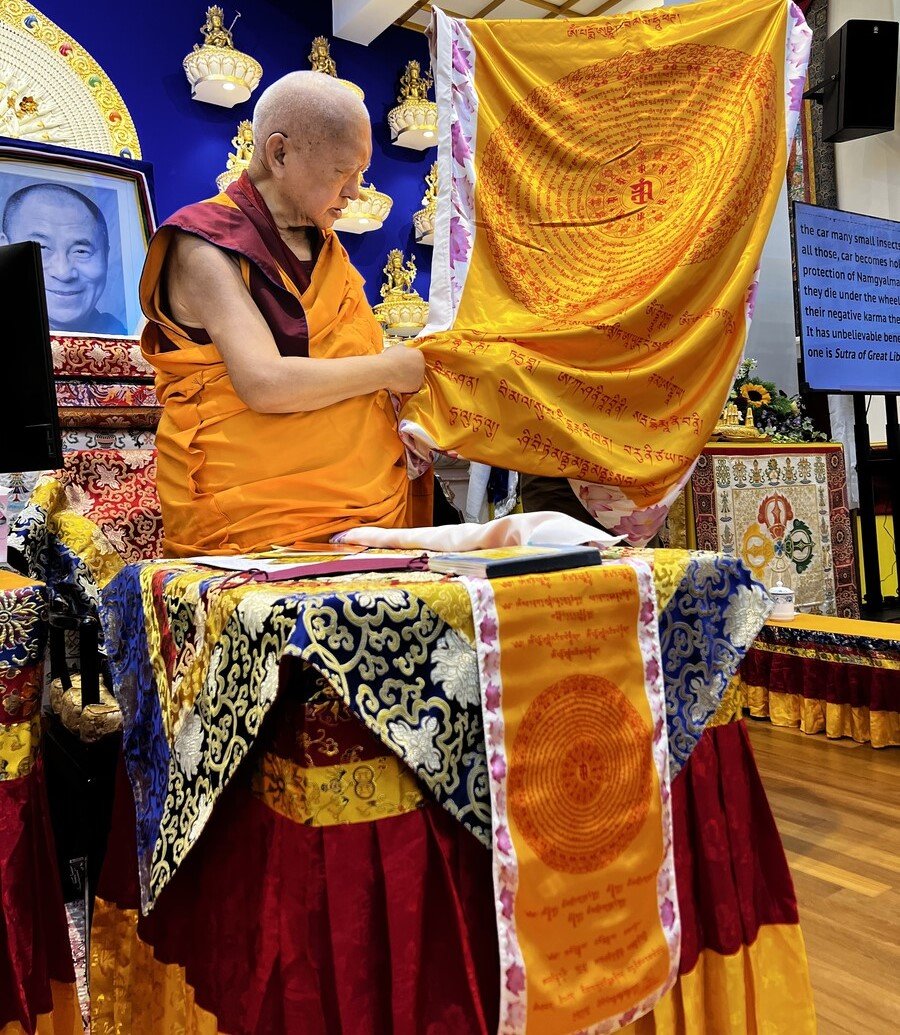
Lama Zopa Rinpoche unveiling the new Liberation Cloth, which has a specified number of mantras that have the power to purify negative karma at the time of death, to students at Amitabha Buddhist Centre, Singapore, August 13, 2022. Photo by Ven. Roger Kunsang.
In Lama Zopa Rinpoche’s teaching on The Four Causes of Unknowing and the Four Dharmakaya Relic Heart Mantras, given on April 9, 2020, Rinpoche recommended that all FPMT centers, projects, services and study groups have cloths covered with beneficial mantras available to help students, friends, and family at the time of death. In the teaching (page nine of the transcript), Rinpoche discusses the intended use of these cloths, which were not yet created. Thanks to generous help actualizing this project by Ven. Tenzin Drachom, we are now delighted to announce that these Liberation Cloths are now available!
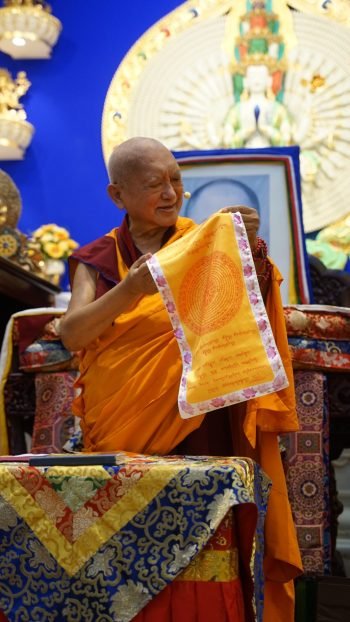
Lama Zopa Rinpoche displaying the small version of the Liberation Cloth, Amitabha Buddhist Centre, Singapore, August 13, 2022. Photo courtesy of ABC FB page.
Printed on the cloth are mantras most useful for the time of death: the short Chenrezig mantra, Heart Mantra of Secret Relic, Lotus Pinnacle of Amoghapāśha Mantra, long and short Namgyalma mantras, mantra of the Sutra of Great Liberation. Rinpoche regularly advises, citing root texts, that covering the body with these mantras purifies negative karma, prevents rebirth in the lower realms and causes the sentient being to be reborn in the upper realms, to meet the Dharma, and to achieve enlightenment.
The cloth should be placed with the mantras face down on the body or away from it and can either be kept on the body during cremation or burial, or removed to be used again. Some use the Liberation Cloth for sick people but it is mainly for the dying and dead. If it is used for the sick, one must make sure it is not slept on, and kept on top of the body.
We invite you to watch this video of Lama Zopa Rinpoche showing the Liberation Cloth while at Kopan Monastery in July 2022 and explaining the benefits of each of the mantras printed on it.
Additionally, at the beginning of Rinpoche’s Thought Transformation Teaching #131: The Purpose of Living Life as a Couple, given on August 13, 2022 at Amitabha Buddhist Centre, Singapore, Rinpoche discusses the new cloths and the intended uses for the various sizes as well as more details about the various mantras used in the design.
We invite you to rejoice at the availability of these new Liberation Cloths which will be so useful in assisting those we hold dear at the critical time of death.
How to Order
- America Region: Order from Land of Medicine Buddha
- Pacific Region: Order from Chenrezig Institute
- Singapore: Order from Amitabha Buddhist Centre (for local pickups only)
Information on how to order from other regions is forthcoming and we will keep you informed as new outlets become available.
Many centers, projects, and services have ordered Liberation Cloths. They should have received them by now so if you ever need a cloth for a dear one at the critical time of death, do check with your local, center, project, or service to see what they have available.
Additional Resources for Death & Dying
Many of these resources are newly available or recently revised and we highly encourage you to take full advantage of all of this invaluable advice and accessible materials which are so useful for helping others at the time of death, as well as preparing for one’s own death.
- Helping Yourself and Others Die Happily: Instructions and Practices for the Time of Death
Lama Zopa Rinpoche asked that the practices found in this booklet be compiled to make it easy for us students to prepare for our own death, and also easy for us to help other people who are dying or dead. - Liberation Tools to Help the Dying and Deceased
This resource, previously known as the Liberation Box, is a collection of tools to help the dying and deceased has been assembled according to Lama Zopa Rinpoche’s advice. It contains powerful methods for ensuring a fortunate rebirth for those who are in the process of dying or have just died. - Practicing the Five Powers Near the Time of Death
As Rinpoche says in Dying Happily with the Five Powers, practicing “the five powers to be applied during life” serves as a preparation for our death. But as the time of our death approaches, we should specifically engage in the practice of “the five powers for near the time of death,” which are what Rinpoche explains in this booklet. - The Array of Sukhavati Pure Land: A Concise Mahayana Sutra – MP3 Download
This album contains Lama Zopa Rinpoche’s oral transmission (*lung) of The Array of Sukhavati Pure Land: A Concise Mahayana Sutra, a prayer that came from Buddha Amitabha. - Holy Objects to Place on the Body at the Time of Death
Contains four sets of holy objects to be placed on the body of the person or animal that is in the process of dying. Cut out one set and place it face down on the dying or deceased person’s chest. Leave it there until the body needs to be moved or washed. - Death & Dying: Practices and Resources homepage
This robust resource page has numerous essential practices related to the topic of death and dying, additional teachings and advice from Lama Zopa Rinpoche, and community service resources.
Through comprehensive study programs, practice materials, training seminars, and scholarships, FPMT Education Services nourishes the development of compassion, wisdom, kindness, and true happiness in individuals of all ages.
- Tagged: advice for death and dying, death, death and dying
25
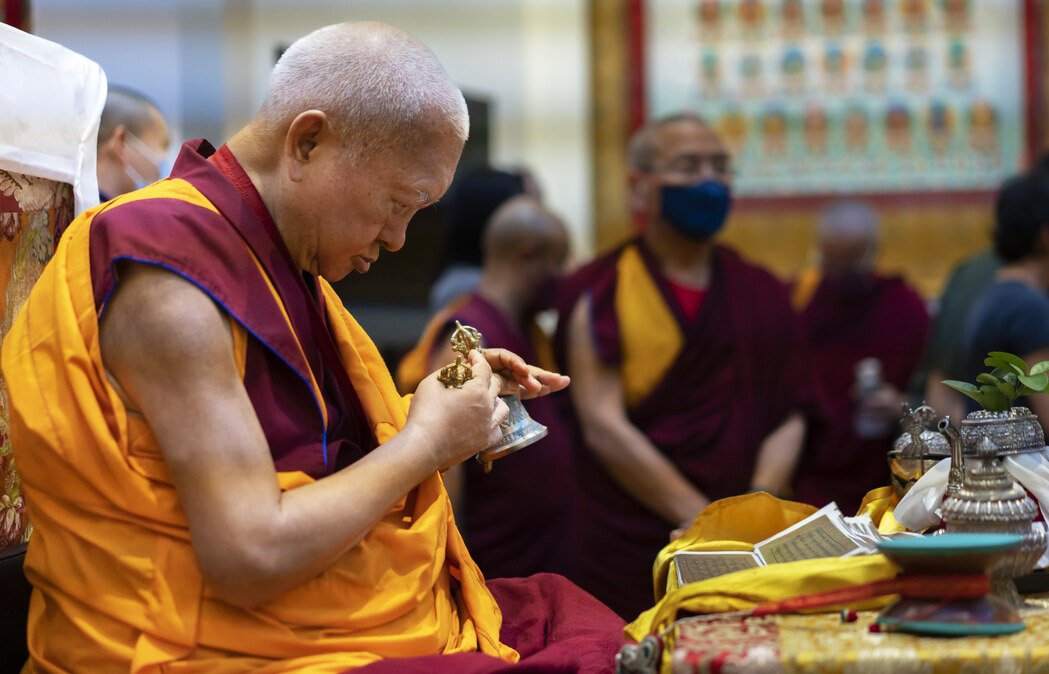
Lama Zopa Rinpoche offering concluding prayers after initiations at Amitabha Buddhist Centre, Singapore, August 2022. Photo by Ven. Lobsang Sherab.
Lama Zopa Rinpoche offered this unrestricted video teaching on August 27, 2022 from Amitabha Buddhist Centre, Singapore, before giving a Heruka Body Mandala initiation. Here’s a summary of Rinpoche’s teaching:
Rinpoche offers the oral transmission of Kachen Yeshe Gyaltshen’s Lojong Chenmo starting at 1:33 in the video and then offers commentary on Advice to Correctly Follow the Virtuous Friend with Thought and Action: The Nine Attitudes of Guru Devotion by mahasiddha Tsogdrug Rangdrol starting at 17:32.
Rinpoche discusses these verses from Shantideva’s Bodhicharyavatara (v. 3.29ab-3.32ab) starting at 1:31:49:
Bodhicitta is the supreme nectar
Destroying the Lord of Death of transmigratory beings.
It is also the unceasing treasure
Eliminating the poverty of transmigratory beings.
Bodhicitta is the best medicine
Healing all the diseases of transmigratory beings.
It is a tree of rest for transmigratory beings
Wandering and exhausted on the samsaric path.
It is like the rising moon of the mind
Eliminating the suffering of the disturbing thoughts of transmigratory beings.
Bodhicitta is the great sun eliminating
The defective view of the ignorance of transmigratory beings.
Bodhicitta is the essence of butter
From churning the milk of the holy Dharma.
It is very rare to generate bodhicitta, Rinpoche reminds us, but in this life we are fortunate to be able to do so. It is important to prepare for death and to write down how one wants to die and what practices one wishes to do at this time. This is the most critical point of life, and we don’t think of it, we ignore it all the time. However, as a human being we have an incredible opportunity to plan for when we are dying. Bodhicitta is the best nectar, so dying with bodhicitta is the best death.
We invite you to go deeper into the topics presented here, plus many others, by watching Rinpoche’s video below.
Watch Lama Zopa Rinpoche’s teaching “To Practice Tantra You Need Guru Devotion and Bodhicitta”:
This summary of Lama Zopa Rinpoche’s teaching is by Carina Rumrill, based on the live transcript by Ven. Joan Nicell and checked by Laura Haughey, with editorial input and additions by Justin Jenkins. This summary is meant to highlight key topics presented by Rinpoche in the recorded video and is not intended to serve as a full representation of Rinpoche’s teaching, which is best received through watching the video and/or reading the full transcript.
Lama Zopa Rinpoche is the spiritual director of the Foundation for the Preservation of Mahayana Tradition (FPMT), a Tibetan Buddhist organization dedicated to the transmission of the Mahayana Buddhist tradition and values worldwide through teaching, meditation and community service.
- Tagged: advice from lama zopa rinpoche, video
24
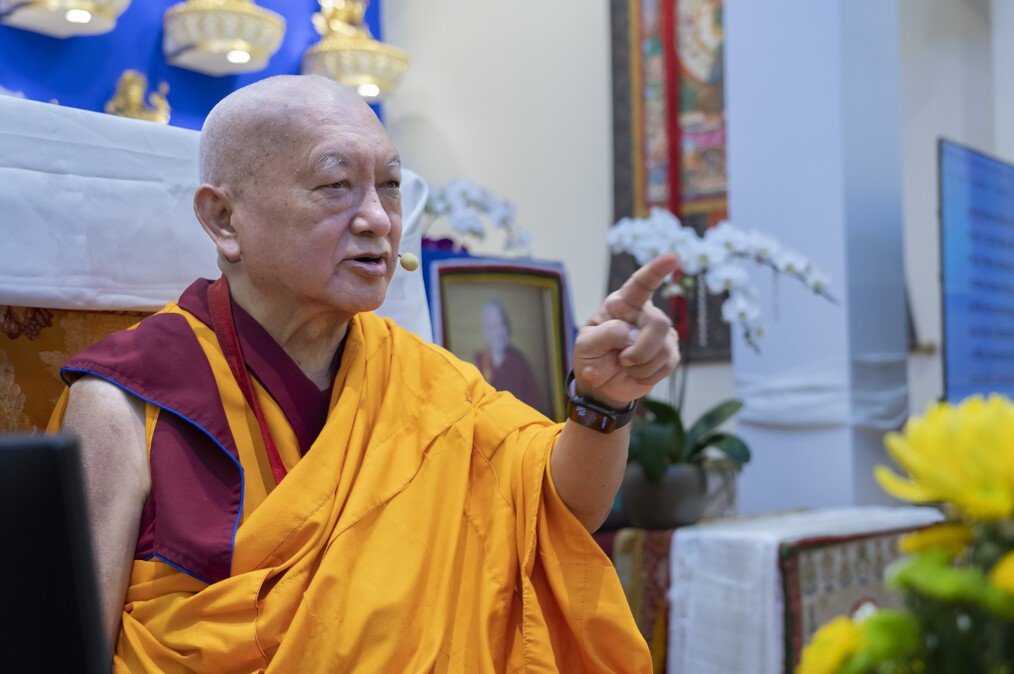
Lama Zopa Rinpoche offering thought transformation teachings at Amitabha Buddhist Centre, Singapore, September 14, 2022. Photo by Ven. Lobsang Sherab.
Lama Zopa Rinpoche continued his video teachings on thought transformation from Amitabha Buddhist Centre, Singapore in August and September, 2022. Here is a summary of the most recent teaching recorded on September 14, 2022:
By not harming others, we are creating the cause for peace in the future, Rinpoche explains. If we fight those who harm us in this life, it creates the cause to fight them again in future lives. This can go on for eons with no peace. Those who win create the cause to lose in the future, and those who lose create the case to win in the future. This is repeated on and on endlessly, a cycle of negative karma and no harmony. If we follow the path of not harming, not fighting, this is the way to create peace in the future.
Rinpoche discusses The Heart Advice of Kadam Scriptures: A Good Vase of Nectar (v. 37):
Whatever happiness and suffering there is in samsara,
All of it comes from your karma.
Therefore, at all times examine your three doors,
And make effort to abandon negative karma and practice virtue.
All the time we should examine our body, speech and mind, all three doors. We should abandon negative karma which is the cause of suffering, and practice Dharma to achieve enlightenment.
When we practice Dharma we are taking care of ourselves, Rinpoche explains. When we don’t practice Dharma, we are not taking care of ourselves, we are using ourselves like garbage, like toilet paper. When we practice Dharma we protect ourselves, we are being a friend to ourselves.
Tonglen is the main practice, Rinpoche urges. When we transform bad conditions into the path to enlightenment, negative experiences are transformed into fortune, into virtue. We can rejoice when we have suffering by thinking of the benefits. Kharag Gomchung said in Seventy-Two Exhortations (v. 7):
Bad conditions are your virtuous friend.
Obstacles persuade you to engage in virtue.
Suffering is a broom that sweeps negative karma away.
Don’t look at suffering as a mistake.
We can begin by transforming small sufferings into the path to enlightenment. By doing this, we are training the mind to be able to transform great problems as well. Since all suffering comes from the self-cherishing thought, when undesirable things arise, we can give it back to the self-cherishing thought, which completely destroys it and we can actually enjoy whatever pain or unpleasant situation arises.
From Lama Chopa (LC 91):
This chronic disease of cherishing myself
Is the cause giving rise to my unsought suffering.
Perceiving this, I seek your blessings to blame, begrudge,
And destroy the monstrous demon of selfishness.
Rinpoche leads a tonglen meditation starting at 2:35:27 in the video.
Rinpoche also offered the Refuge ceremony and some advice regarding taking refuge, starting at 49:56 in the video.
We invite you to go deeper into the topics presented here, plus many others, by watching Rinpoche’s video below and reading the full transcript of Rinpoche’s teaching.
Watch Lama Zopa Rinpoche’s teaching “Tonglen is the Main Practice”:
- Read the transcript of Rinpoche’s teaching.
- Find Rinpoche’s Teachings on Thought Transformation translated into various languages.
- Dedication verses
Summary of Lama Zopa Rinpoche’s teaching by Carina Rumrill based on the transcript by Ven. Joan Nicell with editorial input and additions by Justin Jenkins. This summary is meant to highlight key topics presented by Rinpoche in the recorded video and is not intended to serve as a full representation of Rinpoche’s teaching, which is best received through watching the video and/or reading the full transcript.
Watch more from the video series Lama Zopa Rinpoche’s Teachings on Thought Transformation and find links to videos in transcripts, MP3s, additional practice advice, and more:
https://fpmt.org/fpmt/announcements/resources-for-coronavirus-pandemic/advice-from-lama-zopa-rinpoche-for-coronavirus/
You can listen to this teaching on our full-length-teachings podcast as well:
https://fpmt.org/media/podcasts/
Lama Zopa Rinpoche is the spiritual director of the Foundation for the Preservation of Mahayana Tradition (FPMT), a Tibetan Buddhist organization dedicated to the transmission of the Mahayana Buddhist tradition and values worldwide through teaching, meditation and community service.
- Tagged: advice from lama zopa rinpoche, coronavirus, lama zopa rinpoche thought transformation video teaching, video
11
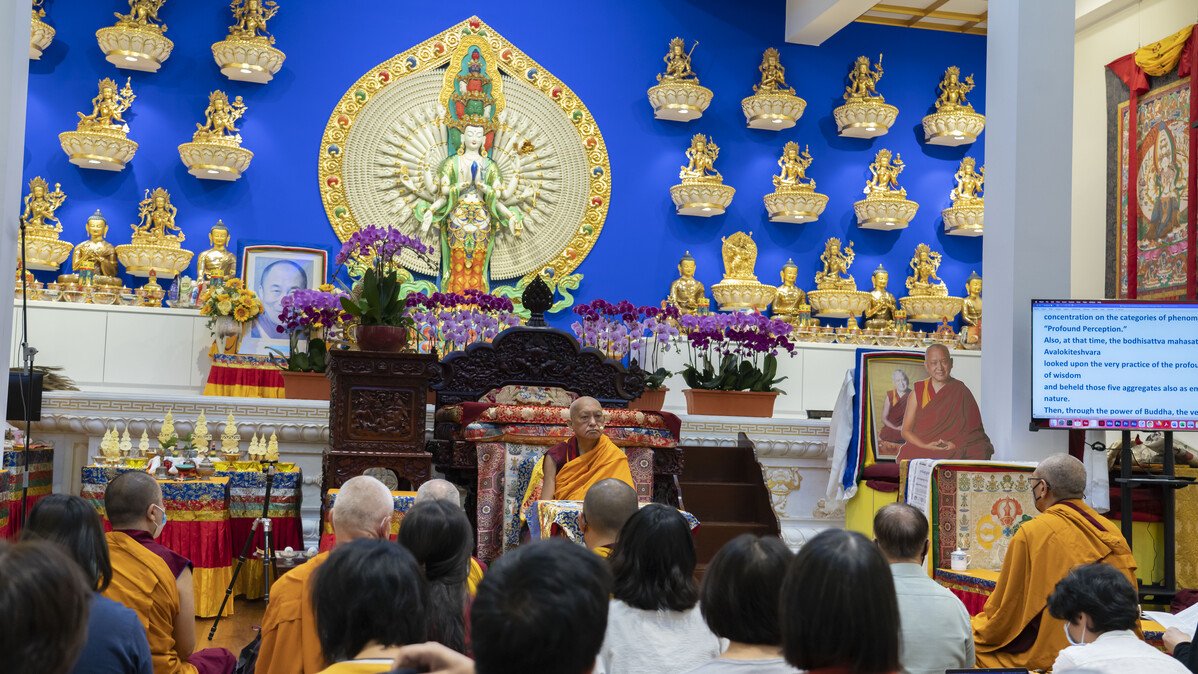
Lama Zopa Rinpoche teaching at Amitabha Buddhist Centre, Singapore, August 2022. Photo by Ven. Lobsang Sherab.
Lama Zopa Rinpoche continued his video teachings on thought transformation from Amitabha Buddhist Centre in Singapore in August and September. Here is a summary of the teaching offered on September 10, 2022:
During Rinpoche’s September 3 teaching (#134 In Your Life as a Couple, Practice Good Heart), Rinpoche offered the oral transmission for Lama Tsongkhapa’s Utilizing Suffering in the Path to Enlightenment. Rinpoche began giving commentary on this important thought transformation text in the September 7 teaching (#135: The Great Difference Between Taking and Not Taking Vows).
In this latest teaching from September 10, Rinpoche continues the commentary on Utilizing Suffering in the Path to Enlightenment starting at 40:06. During this commentary, Rinpoche discusses the benefits of experiencing suffering, including:
- When You Experience Suffering, You Develop Renunciation of Samsara
- When You Experience Suffering, You Develop Trust in the Objects of Refuge
- When You Experience Suffering, It Dispels Arrogance
- When You Experience Suffering, You Become Careful of Negative Karma
- When You Experience Suffering, You Enjoy Virtue
- When You Experience Suffering, You Develop Compassion for Sentient Beings
We invite you to go deeper into the topics presented here, plus many others, by watching Rinpoche’s video below, and reading the full transcript of Rinpoche’s teaching.
Watch Lama Zopa Rinpoche’s teaching “The Benefits of Experiencing Suffering”:
- Read the transcript of Rinpoche’s teaching
- Find Rinpoche’s Teachings on Thought Transformation translated into various languages.
- Dedication verses
Summary of Lama Zopa Rinpoche’s teaching by Carina Rumrill based on the rough transcript by Ven. Joan Nicell with editorial input and additions by Justin Jenkins. This summary is meant to highlight key topics presented by Rinpoche in the recorded video and is not intended to serve as a full representation of Rinpoche’s teaching, which is best received through watching the video and/or reading the full transcript which we will make available once completed.
Watch more from the video series Lama Zopa Rinpoche’s Teachings on Thought Transformation and find links to videos in transcripts, MP3s, additional practice advice, and more:
https://fpmt.org/fpmt/announcements/resources-for-coronavirus-pandemic/advice-from-lama-zopa-rinpoche-for-coronavirus/
You can listen to this teaching on our full-length-teachings podcast as well:
https://fpmt.org/media/podcasts/
Lama Zopa Rinpoche is the spiritual director of the Foundation for the Preservation of Mahayana Tradition (FPMT), a Tibetan Buddhist organization dedicated to the transmission of the Mahayana Buddhist tradition and values worldwide through teaching, meditation and community service.
- Tagged: advice from lama zopa rinpoche, coronavirus, lama zopa rinpoche thought transformation video teaching, video
7
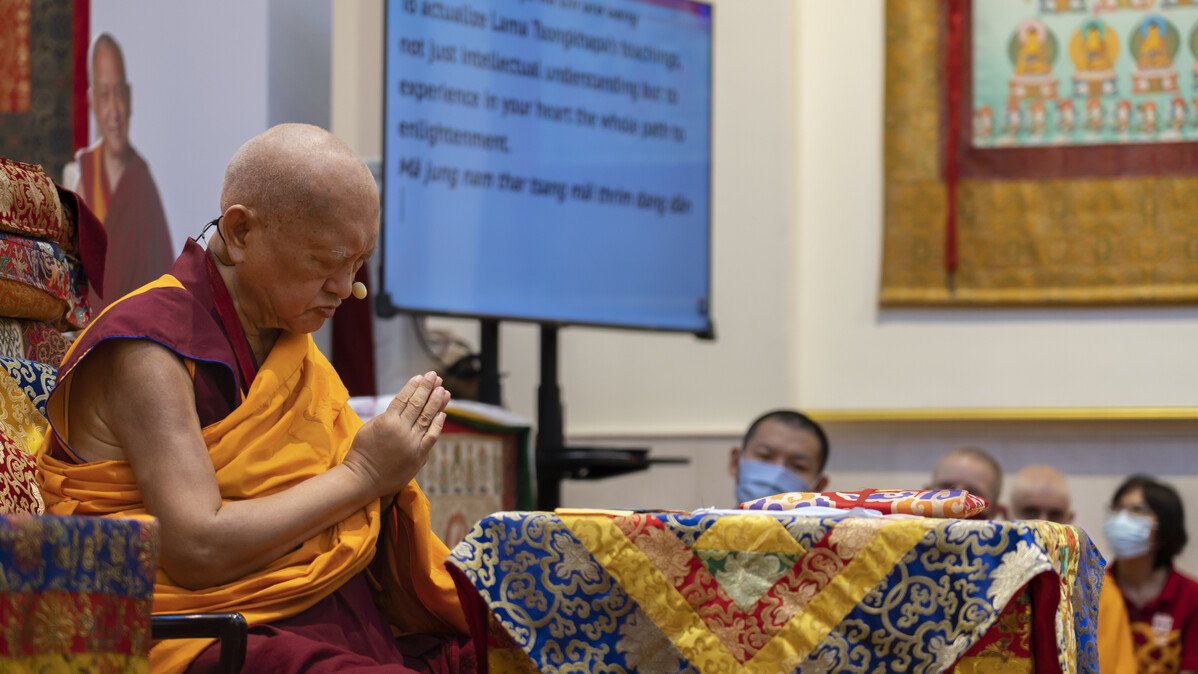
Lama Zopa Rinpoche teaching at Amitabha Buddhist Centre, Singapore, August 2022. Photo by Ven. Lobsang Sherab.
Lama Zopa Rinpoche continued his video teachings on thought transformation from Amitabha Buddhist Centre in Singapore in August and September. Here is a summary of the teaching offered on September 7, 2022:
The most important Dharma, Rinpoche teaches us, is compassion. If you are becoming kinder and more compassionate, this means you are practicing Dharma.
Rinpoche discusses the importance of taking vows. Our virtue is much more extensive after having taken vows than if we have not taken any. This is also true for the non-virtues: it is heavier negative karma for someone ordained to commit a trivial misdeed than for a lay person to indulge in the ten non-virtues. This is why it is so heavy when people who hold bodhisattva vows, and even more so, tantric vows, commit misdeeds. We should take and receive vows to receive a human rebirth again because there is no cause for a higher rebirth other than practicing ethics. We create great merit even by keeping even one precept. By taking vows, one’s virtue increases continuously—even while sleeping, and by not having vows and committing non-virtue, one’s negative karma increases continuously. Because of this, we need to purify our negative karma to stop it from increasing every day.
Rinpoche offers the lung of the Vajrasattva long and short mantras (1:31:17 in the video), to help us with our practice or purification.
Long Vajrasattva Mantra
OṂ VAJRASATVA SAMAYA / MANUPĀLAYA / VAJRASATVA TVENOPATIṢṬHA / DṚḌHO ME BHAVA / SUTOṢYO ME BHAVA / SUPOṢYO ME BHAVA / ANURAKTO ME BHAVA / SARVA SIDDHIM ME PRAYACCHA / SARVA KARMASU CA ME / CITTAṂ ŚRĪYAṂ KURU HŪṂ / HA HA HA HA HOḤ / BHAGAVĀN SARVA TATHĀGATA / VAJRA MĀ ME MUÑCA / VAJRĪ BHAVA / MAHĀ SAMAYASATVA ĀḤ HŪṂ PHAṬ
Short Vajrasattva Mantra
OṂ VAJRASATVA HŪṂ
During Rinpoche’s September 3 teaching (#134 In Your Life as a Couple, Practice Good Heart), Rinpoche offered the lung for Lama Tsongkhapa’s Utilizing Suffering in the Path to Enlightenment. In this video, Rinpoche began translating and offering commentary on this important thought transformation teaching by Lama Tsongkhapa at 1:40:14.
We invite you to go deeper into the topics presented here, plus many others, by watching Rinpoche’s video below and reading the full transcript of Rinpoche’s teaching.
Watch Lama Zopa Rinpoche’s teaching “The Great Difference Between Taking and Not Taking Vows”:
- Read the transcript of Rinpoche’s teaching.
- Find links to resources to support your Vajrasattva practice in the Foundation Store.
- Find Rinpoche’s Teachings on Thought Transformation translated into various languages.
- Dedication verses
Summary of Lama Zopa Rinpoche’s teaching by Carina Rumrill based on the rough transcript by Ven. Joan Nicell with editorial input and additions by Justin Jenkins. This summary is meant to highlight key topics presented by Rinpoche in the recorded video and is not intended to serve as a full representation of Rinpoche’s teaching, which is best received through watching the video and/or reading the full transcript which we will make available once completed.
Watch more from the video series Lama Zopa Rinpoche’s Teachings on Thought Transformation and find links to videos in transcripts, MP3s, additional practice advice, and more:
https://fpmt.org/fpmt/announcements/resources-for-coronavirus-pandemic/advice-from-lama-zopa-rinpoche-for-coronavirus/
You can listen to this teaching on our full-length-teachings podcast as well:
https://fpmt.org/media/podcasts/
Lama Zopa Rinpoche is the spiritual director of the Foundation for the Preservation of Mahayana Tradition (FPMT), a Tibetan Buddhist organization dedicated to the transmission of the Mahayana Buddhist tradition and values worldwide through teaching, meditation and community service.
- Tagged: advice from lama zopa rinpoche, coronavirus, lama tsongkhapa, lama zopa rinpoche thought transformation video teaching, vajrasattva, video
5
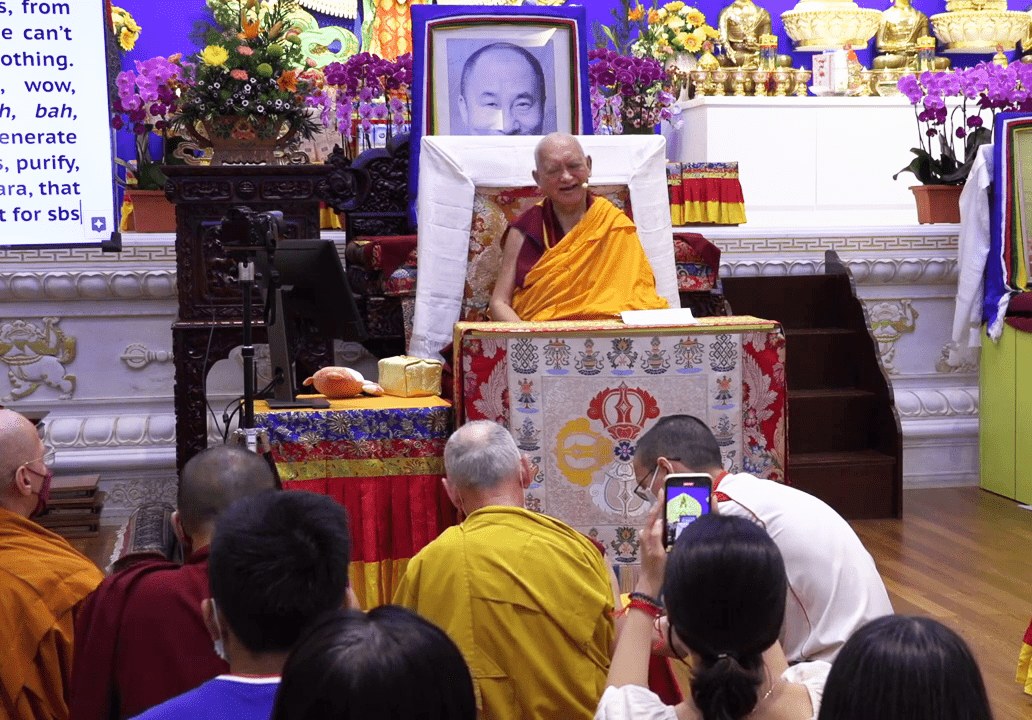
Lama Zopa Rinpoche giving thought transformation teachings at Amitabha Buddhist Centre, Singapore, September 3, 2022.
Lama Zopa Rinpoche continued his video teachings on thought transformation from Amitabha Buddhist Centre in Singapore in August and September. Here is a summary of the teaching offered on September 3, 2022:
For those of us living as a couple in relationships, we need to practice having a good heart. With body, speech, and mind, we have incredible opportunities to collect good karma. If we dedicate our own lives to serving others, to create happiness and reduce suffering in others, then we influence our companions to gradually do the same. This is really offering so much help to them, helping them to be free from samsara and attain enlightenment more quickly. Even if not thinking about enlightenment, even if not Buddhist, it is still very logical to practice a good heart because it brings so much happiness to others.
Rinpoche offers the oral transmission of Lama Tsongkhapa’s thought transformation teaching, Utilizing Suffering in the Path to Enlightenment at 1:13:44 in the video.
At the end of this teaching, Rinpoche also shared some advice offered to a geshe in Singapore who contracted Covid-19. Rinpoche requested that copies of this advice be made available so that those who receive it will, “enjoy the most and be most happy.” This full advice is available to all.
We invite you to go deeper into the topics presented here, plus many others, by watching Rinpoche’s video below and reading the full transcript of Rinpoche’s teaching.
Watch Lama Zopa Rinpoche’s teaching “In Your Life as a Couple, Practice Good Heart”:
- Read the transcript of Rinpoche’s teaching.
- Find Rinpoche’s Teachings on Thought Transformation translated into various languages.
- Dedication verses
Summary of Lama Zopa Rinpoche’s teaching by Carina Rumrill based on the rough transcript by Ven. Joan Nicell with editorial input and additions by Justin Jenkins. This summary is meant to highlight key topics presented by Rinpoche in the recorded video and is not intended to serve as a full representation of Rinpoche’s teaching, which is best received through watching the video and/or reading the full transcript which we will make available once completed.
Watch more from the video series Lama Zopa Rinpoche’s Teachings on Thought Transformation and find links to videos in transcripts, MP3s, additional practice advice, and more:
https://fpmt.org/fpmt/announcements/resources-for-coronavirus-pandemic/advice-from-lama-zopa-rinpoche-for-coronavirus/
You can listen to this teaching on our full-length-teachings podcast as well:
https://fpmt.org/media/podcasts/
Lama Zopa Rinpoche is the spiritual director of the Foundation for the Preservation of Mahayana Tradition (FPMT), a Tibetan Buddhist organization dedicated to the transmission of the Mahayana Buddhist tradition and values worldwide through teaching, meditation and community service.
- Home
- News/Media
- Study & Practice
- About FPMT Education Services
- Latest News
- Programs
- New to Buddhism?
- Buddhist Mind Science: Activating Your Potential
- Heart Advice for Death and Dying
- Discovering Buddhism
- Living in the Path
- Exploring Buddhism
- FPMT Basic Program
- FPMT Masters Program
- FPMT In-Depth Meditation Training
- Maitripa College
- Lotsawa Rinchen Zangpo Translator Program
- Universal Education for Compassion & Wisdom
- Online Learning Center
- Prayers & Practice Materials
- Overview of Prayers & Practices
- Full Catalogue of Prayers & Practice Materials
- Explore Popular Topics
- Benefiting Animals
- Chenrezig Resources
- Death & Dying Resources
- Lama Chopa (Guru Puja)
- Lama Zopa Rinpoche: Compendium of Precious Instructions
- Lama Zopa Rinpoche: Life Practice Advice
- Lama Zopa Rinpoche Practice Series
- Lamrim Resources
- Mantras
- Prayer Book Updates
- Purification Practices
- Sutras
- Thought Transformation (Lojong)
- Audio Materials
- Dharma Dates – Tibetan Calendar
- Translation Services
- Publishing Services
- Teachings and Advice
- Find Teachings and Advice
- Lama Zopa Rinpoche Advice Page
- Lama Zopa Rinpoche: Compendium of Precious Instructions
- Lama Zopa Rinpoche Video Teachings
- ༧སྐྱབས་རྗེ་བཟོད་པ་རིན་པོ་ཆེ་མཆོག་ནས་སྩལ་བའི་བཀའ་སློབ་བརྙན་འཕྲིན།
- Podcasts
- Lama Yeshe Wisdom Archive
- Buddhism FAQ
- Dharma for Young People
- Resources on Holy Objects
- Ways to Offer Support
- Centers
- Affiliates Area
- Teachers
- Projects
- Charitable Projects
- Make a Donation
- Applying for Grants
- News about Projects
- Other Projects within FPMT
- Support International Office
- Projects Photo Galleries
- Give Where Most Needed
- FPMT
- Shop
Translate*
*powered by Google TranslateTranslation of pages on fpmt.org is performed by Google Translate, a third party service which FPMT has no control over. The service provides automated computer translations that are only an approximation of the websites' original content. The translations should not be considered exact and only used as a rough guide.If your path teaches you to act and exert yourself correctly and leads to spiritual realizations such as love, compassion and wisdom then obviously it’s worthwhile.







